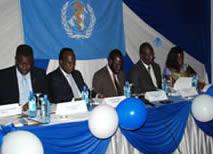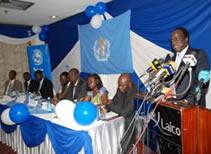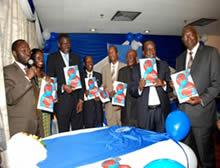Kenya Launches the Universal Access Report
Nairobi, 30 September 2010 -- There has been significant progress and positive development in increasing access to HIV/AIDS services. This was according to the latest progress report released in Nairobi on 28th September as part of the global launch of the report “Towards Universal Access”, also held in Geneva and Washington. The report by WHO, UNICEF and UNAIDS was the fourth annual report for tracking progress made in achieving the 2010 target of providing universal access to HIV prevention, treatment and care. The launch of the report was presented at a press conference, held at the Laico Regency Hotel in Nairobi and was addressed by a panel of speakers, including: Dr. David Okello, Director, HIV/AIDS, TB and Malaria (ATM) Cluster, WHO Regional Office for Africa (AFRO); Dr. Jack Abdoulie, the WHO Country Representative, Kenya; Mr. Elhadj As Sy, Regional Director for Eastern and Southern Africa, UNICEF; Mr. Nelson Otuoma, Director, National Empowerment Network of People living with HIV/AIDS in Kenya (NEPHAK); the Honorable Professor Peter Anyang’ Nyong’o, Minister of Medical Services Kenya; and both local and international media houses and representatives.
The report assessed HIV/AIDS progress in 144 low- and middle-income countries in 2009. “There is good news in the report, the latest progress results confirm universal access to key HIV prevention, treatment and care services is achievable” said Dr. David Okello, Director ATM Cluster, WHO-AFRO. Dr. Okello highlighted the key finding of progress noted in countries, regions and globally with an emphasis on the African region, and congratulated Member States and all partners involved in HIV/AIDS programmes for these achievements and dedication.
He however, underlined that progress was uneven with huge differences between parts of the world, across countries, and even within countries.
ART coverage rate for the African region went up by 33% (28% in 2008 to 37% in 2009), but important intraregional differences in coverage were observed with greater access (41%) seen in Eastern and Southern Africa than in West and Central Africa (25%).
According to the report, Africa is where the highest progress was seen in 2009, but it is also where most progress needs to be made in the future. Dr. Okello further emphasized the need to address the challenges facing HIV/AIDS intervention scale up; these include: the need for better integration of HIV/AIDS with other healthcare programmes, need to address health systems bottlenecks; as well as dealing with the problem of drug stock outs and issues of patients lost to follow up.
He further noted that donor funding for HIV/AIDS had flat-lined in 2009, for the first time in 15 years. Dr. Okello drew the attention of all to the Call to Action in the report. The report called for a clear set of actions to be taken by the international community to tackle existing gaps and challenges. To assist this progress, WHO is currently undertaking a broad range of consultations with all stakeholders, to develop a new Global health Sector Strategy for HIV/AIDS, for the period 2011-2015. These new guidelines should include strategies consistent with the recommendations of this progress report.
Dr. Okello finally took the opportunity to highlight some of the success in HIV/AIDS prevention and services in Kenya as per the report. He commended the country for its great leadership in spearheading the scale up of male circumcision, the increment of the number of people put on anti-retroviral treatment and the positive efforts in the area of HIV testing.
In his remarks to the press, the UNICEF Regional Director highlighted the progress made in the areas of Prevention of Mother to Child Transmission (PMTCT). “While many countries are now showing significant progress, intensified efforts are urgently needed to reach all mothers and children with the most effective treatment and PMTCT interventions for their own health and for the sake of their communities”, noted Mr. Elhadj As Sy, the UNICEF Regional Director. A call to international communities to honor their funding pledges and increase funding to HIV/AIDS was made by Mr. Nelson Otuoma, the director of NEPHAK and a representative of the civil society bodies.
Mr. Otuoma acknowledged and thanked WHO for selecting Kenya as the launching pad of the report in Africa.
He appreciated the continued support WHO has been providing the government in addressing challenges facing HIV/AIDS interventions.
In his key remarks the Honorable Minster of Medical Services, Prof. Peter Anyang’ Nyong’o recommended WHO for its continuous support to the country in not only the area of HIV/AIDS, but in other health issues. He also thanked WHO and partners for launching the report in Nairobi on behalf of the African region. He highlighted the country’s success and challenges in providing HIV/AIDS services and assured all of the government’s commitment in increasing access to these services, including the allocation of more public funds to scale up HIV/AIDS interventions.
The press conference concluded with question and answers from the press, which were duly responded to by the panel of speakers. Finally, the press conference concluded with a vote of thanks from Dr. Abdoulie Jack, WHO Country Representative, who thanked all the panel speakers and members of the media for gracing the occasion. Dr. Jack once again retaliated on the key findings of the report: the significant progress made so far, existing disparities across countries; the needed for sustained funding to sustain and scale up progress and the new global health strategy for HIV/AIDS currently being developed by WHO to strengthen global response to HIV/AIDS.
For more information contact:
World Health Organization, Kenya
4th floor ACK Garden House.
1st Ngong Avenue./ Bishop Rd.
P.O. BOX 45335, 00100 (GPO)
Nairobi, Kenya.
Email:wrkenya [at] ke.afro.who.int


